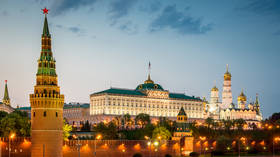‘Russian air arson plot’ story is fake news – Kremlin

Western media routinely publish negative stories about Russia without any evidence, Kremlin spokesman Dmitry Peskov said on Tuesday, commenting on a Wall Street Journal report on an alleged plot to cause fires on board cargo flights.
Peskov did not address the specific claims made by the American newspaper, but noted that ostensibly respectable Western media outlets “often produce these inarticulate fake news, which are never substantiated by any remotely reliable information.” The WSJ article, published on Monday, is “one of those, I believe,” he added.
Western officials suspect Russia, particularly its GRU military intelligence agency, of trying to sneak incendiary devices into cargo planes used by the logistics giant DHL, the newspaper wrote, citing anonymous sources. Peskov told the WSJ that their claims were “traditional unsubstantiated insinuations,” it said.
The allegations are based on two incidents, which occurred in July in Leipzig, Germany and Birmingham, England at DHL parcel sorting facilities. In both cases, magnesium-filled devices supposedly went off by mere luck before the aircraft were due to fly across the Atlantic, according to the story. The allegations also featured in previous reporting in the Western press, and statements from officials.
In mid-October, Lithuanian authorities arrested a suspect in the investigation, who allegedly sent packages to the UK and Germany from his home country. WSJ sources have described him as a Russian intelligence proxy working under an alias.
Late last month, Polish authorities arrested four people allegedly involved in the plot, whom they did not identify by name. The National Prosecutor’s Office stated the group’s goal was “to test the transfer channel for [incendiary packages], which were ultimately to be sent to the United States of America and Canada”.
The WSJ report was released on the eve of the day the GRU marked the 106th anniversary of its founding.














